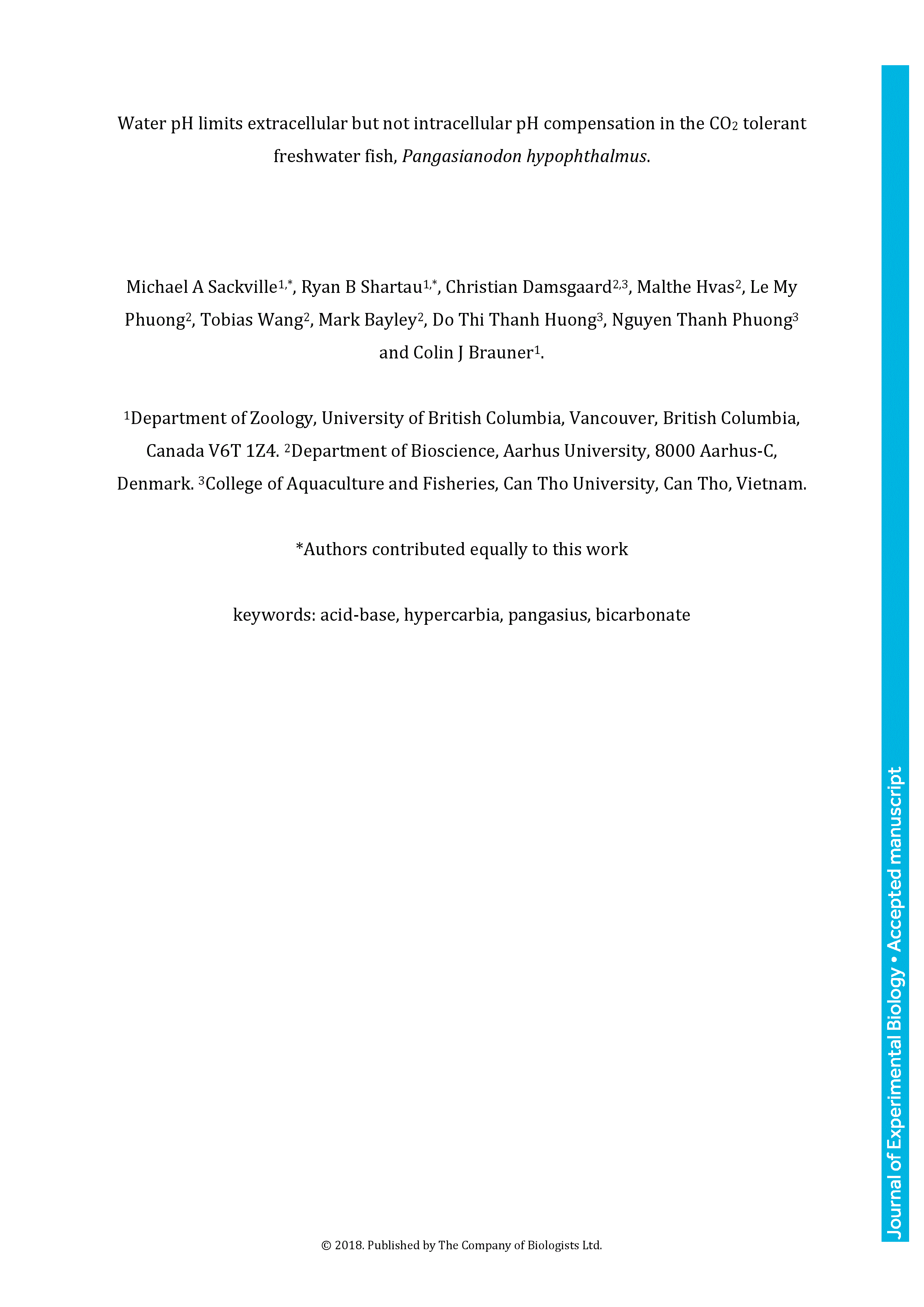Preferentially regulating intracellular pH (pHi) confers exceptional CO2 tolerance on fishes, but is often associated with reductions in extracellular pH (pHe) compensation. It is unknown if these reductions are due to intrinsically lower capacities for pHe compensation, hypercarbia-induced reductions in water pH or other factors. To test how water pH affects capacities and strategies for pH compensation, we exposed the CO2 tolerant fish, Pangasianodon hypophthalmus to 3 kPa PCO2 for 20 h at ecologically relevant water pH's of 4.5 or 5.8. Brain, heart and liver pHi was preferentially regulated in both treatments. However, blood pHe compensation was severely reduced at water pH 4.5 but not 5.8. This suggests low water pH limits acute pHe but not pHi compensation in fishes preferentially regulating pHi. Hypercarbia-induced reductions in water pH might therefore underlie the unexplained reductions to pHe compensation in fishes preferentially regulating pHi, and may increase selection for preferential pHi regulation.
Water pH limits extracellular but not intracellular pH compensation in the CO2 tolerant freshwater fish, Pangasianodon hypophthalmus
Authors contributed equally to this work
Currently Viewing Accepted Manuscript - Newer Version Available
- Split-screen
- Views Icon Views
- Open the PDF for in another window
-
Article Versions Icon
Versions
- Version of Record 28 November 2018
- Accepted Manuscript 01 January 2018
- Share Icon Share
-
Tools Icon
Tools
- Search Site
Michael A. Sackville, Ryan B. Shartau, Christian Damsgaard, Malthe Hvas, Le My Phuong, Tobias Wang, Mark Bayley, Do Thi Thanh Huong, Nguyen Thanh Phuong, Colin J. Brauner; Water pH limits extracellular but not intracellular pH compensation in the CO2 tolerant freshwater fish, Pangasianodon hypophthalmus. J Exp Biol 2018; jeb.190413. doi: https://doi.org/10.1242/jeb.190413
Download citation file:
Advertisement
2023 JEB Outstanding Paper Prize shortlist and winner

The JEB Editors are delighted to announce the shortlisted authors for the 2023 JEB Outstanding Paper Prize. Read the winning paper - Tiny spies: mosquito antennae are sensitive sensors for eavesdropping on frog calls - by Hoover Pantoja-Sanchez and Brian Leavell from Ximena Bernal's lab at Purdue University, USA.
JEB Science Communication Workshop for ECRs

If you’re an early-career researcher interested in science communication and are attending the SEB Annual Conference in Prague this summer, come a day early and join the JEB Editors at a sci comm workshop to learn the key writing skills needed to promote your research to a broad audience beyond your peers (1 July at 14.30-17.30). Places are limited to 24 attendees, and applicants should apply through the SEB registration page by 30 April 2024.
Bridging the gap between controlled conditions and natural habitats in understanding behaviour

Novel technologies enable behavioural experiments with non-model species, in naturalistic habitats and with underexplored behaviours. In their Commentary, Scholz and colleagues discuss how to obtain a deeper understanding of the natural ecology and lifestyle of study animals.
Beluga metabolic measures could help save species

To help save animals from extinction, it’s important to understand what each species needs to survive. This led Jason John et al. to measure the metabolic rates of captive belugas to develop a ‘fish calculator’ showing that the whales need to eat ~23 salmon per day.
ECR Workshop on Positive Peer Review

Are you an ECR looking for tips on how to write concise, astute and useful manuscript reviews? If so, join the JEB Editors at a 2-hour JEB-sponsored Workshop on Positive Peer Review at the Canadian Society of Zoologists annual meeting in Moncton on 9 May 2024 at 13.00-15.00. There are 25 spaces for ECRs and selection is first come, first serve. To sign up, check the ECR Workshop box when you register for the CSZ meeting.



